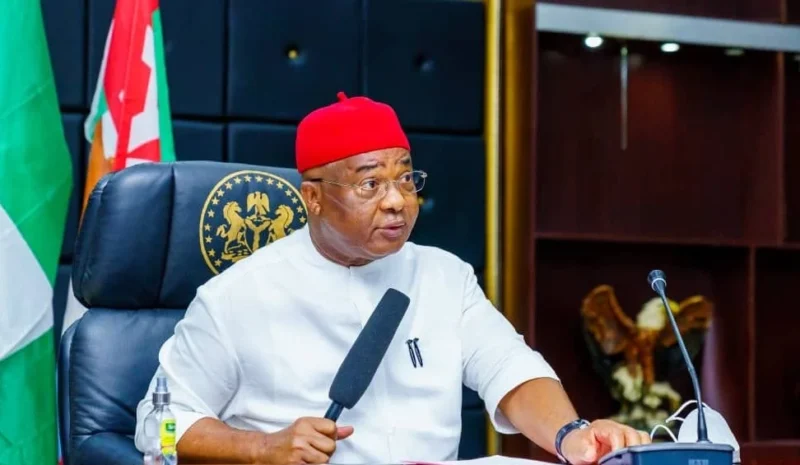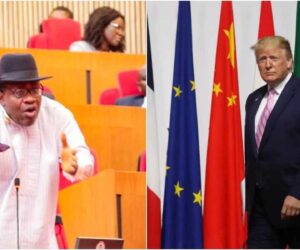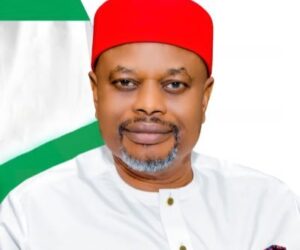Imo State Governor and Chairman of Progressive Governors’ Forum, Senator Hope Uzodinma, on Monday advised traditional rulers in the country to rise above partisan politics and preserve the dignity and neutrality of the traditional institution.
He warned that involvement in politics could erode public trust and weaken their moral authority, saying, “Don’t allow anyone to drag your stool into the political arena.”
The governor made the call while delivering keynote address at the National Executive Committee meeting of the National Council of Traditional Rulers of Nigeria (NCTRN) held in Lagos.
SPONSOR AD
Speaking as the Special Guest of Honour, Uzodinma who also declared the meeting open on behalf of President Bola Ahmed Tinubu, reiterated that traditional rulers remain central to Nigeria’s governance and national cohesion.
The meeting was attended by no fewer than 10 governors, prominent traditional rulers across Nigeria who are members of the council co-chaired by the Sultan of Sokoto, Alhaji Muhammad Saad Abubakar and Ooni of Ife, Oba Adeyeye Enitan Ogunwusi.
The governors in attendance were Chairman of the Nigerian Governors’ Forum and Kwara State Governor, Alhaji Abdulrahman Abdulrasaq; Governors Usman Ododo of Kogi; Dikko Umar Radda of Katsina; Nasir Idris of Kebbi; Aliyu Ahmed of Sokoto; Mai Mala Buni of Yobe; Bassey Otu of Cross Rivers; Monday Okpebholo of Edo and Abiodun Oyebanji of Ekiti.
Uzodinma, who spoke on the theme, “The Traditional Institution: The Imperative of its inclusion in the effective and efficient governance in Nigeria”, promised to support the ongoing advocacy for constitutional role for traditional rulers.
He said, “Your Royal Majesties, your continued relevance rests on public trust — and that trust must be protected,” he said.
“As royal fathers, your voice carries a weight that political office cannot replicate. You do not serve a party. You serve the people. That is why the nation expects, and rightly so, that you rise and remain above the noise of partisan politics,” he added.
The governor noted that neutrality should not be mistaken for weakness but rather seen as strength and a symbol of wisdom, advising the traditional rulers to speak truth to power without bias.
According to him, the absence of a constitutional role for traditional rulers is a gap that must be filled. He said the time has come to right the wrong.
The governor further traced his roots to the traditional system, adding that he understood the role and influence of royal fathers from both experience and heritage.
He praised their contributions to community stability, dispute resolution, and cultural preservation, describing them as the “unifying forces that bind the Nigerian people together.”
Uzodinma recalled that under Nigeria’s First Republic, traditional rulers played a constitutionally recognised role in governance. He cited provisions from the 1963 Republican Constitution, which included traditional rulers in the federal and regional legislative structures through Houses of Chiefs in the Northern, Western, Mid-Western, and Eastern Regions.
According to him, the exclusion of traditional rulers from constitutional recognition began with the 1979 Constitution and continued under the 1999 Constitution, which limited their roles to advisory functions defined at the discretion of state governments.
“Traditional rulers have remained stabilising forces in their communities despite the absence of legal backing,” adding that their relevance is never in doubt and they have continued to play their roles despite not having any constitutional role.
The governor argued that other African democracies such as Ghana, South Africa, and Namibia have successfully integrated traditional institutions into modern governance frameworks. He noted that Ghana’s 1992 Constitution, South Africa’s 1996 Constitution, and Namibia’s 1990 Constitution all formally recognised the authority of traditional rulers within their political systems.
“Clearly, these are constitutional democracies that have found room for their traditional institutions without compromising the integrity of their republics,” he said, adding, “If Ghana, South Africa, and Namibia, with similar histories and diversity, can give constitutional expression to their traditional systems, why not Nigeria?”
Uzodinma said it was time for Nigeria to follow suit by giving constitutional backing to traditional rulers, not as a privilege but as a recognition of their indispensable role in governance and peacebuilding.
“The traditional institution remains one of Nigeria’s most enduring systems. Its custodianship of culture, its ability to mediate disputes, and its place in the lives of the people make it indispensable to national stability,” he stated.
He assured the royal fathers that he would fully support any move by the National Assembly or other organs of government to grant constitutional recognition to the traditional institution.








